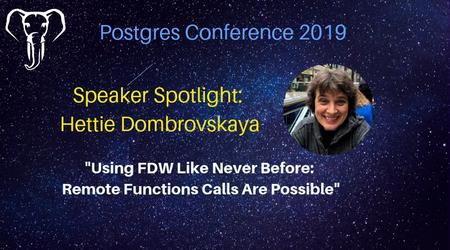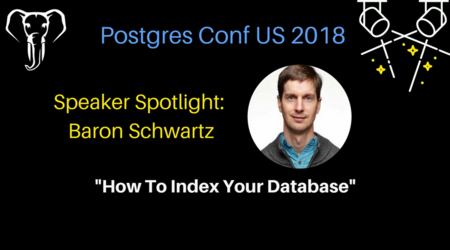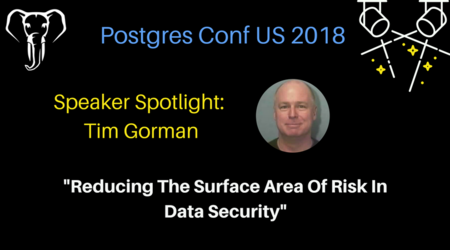
As part of the countdown to PostgresConf US 2019, learn more about the engaging content and our speakers for this year in our Speaker Spotlight Series.
Henrietta "Hettie" Dombrovskaya is a database researcher and developer with over 30 years of academic and industrial experience. She holds a Ph.D. in Computer Science from University of Saint Petersburg, Russia, where she taugh Database and Transaction Theory, as well as multiple database tuning classes for both beginners and advanced professionals.
Her professional experience includes consulting for a number of government projects, and providing Data services in the financial sector, manufacturing, and distribution. She is a co-author, with B. Novikov, of the book “System Tuning." As Associate Director of DB at Braviant Holdings, she is happy to have an opportunity to implement the results of her research in practice.
Hettie will be presenting a breakout session on Wednesday, March 20, on "Using FDW Like Never Before." Read what she has to say about Postgres and why to attend her session:
Why Postgres? Tell us about your involvement with the greater Postgres community.
I started to use Postgres by pure accident. I used to be a hard-core Oracle person, with 20 years of Oracle experience, and then I was offered a job at a company that was using Postgres. The year was 2010. I hadn't use Postgres since my student years and Stonebraker's version, so I reluctantly agreed -- thinking that it would be a very temporal job. But after a couple of months I found myself completely enchanted with Postgres, and decided to stay -- with Postgres as well as with the company.
For the past several years I've being more active in promoting Postgres in different communities. My goal is to show the variety of ways Postgres can be used virtually anywhere, to promote Postgres among industries, developers and in academia. Since Dec 2016 I have led a Chicago PostgreSQL User Group, and I always make sure I have interesting speakers every month. Also, I am actively participating in the development and promotion of bitemporal framework in Postgres.
What features do you believe should be developed/improved and released in the next major upgrade?
I hope that bitemporal framework will be eventually implemented as a real extension.
Why should attendees come to your talk at PostgresConf US 2019? What would you like for them to take away from your session?
I have two sessions at this conference. The first one, "Using FDW Like Never Before" is literally about "where there is a will, there is a way"! I am just showing a cool technique everyone can use, and hope somebody will build a Postgres feature on this idea.
The subject of the second session, ""Connecting Galaxies: Information Exchange Techniques for Java/PostgreSQL Applications" -- which I am co-presenting with Alyssa Ritchie -- is something I have been working on throughout my entire professional life. Most of the time when database people talk about optimization, they mean the SQL queries optimization. When we are talking about the real-life application -- not the abstract query -- the most performance gains can be achieved when optimizing the way an application interacts with a database.
This is one of the topics which "does not belong", and neither DB people, nor the application people want to claim it. So, once again, I am trying to profess and spread the word.
What advice would you have for a Computer Science graduate or entry level developer who are interested in learning and engaging with Postgres?
Revisit your freshman year math, calculus and algebra. You can't write good SQL without it.
Check out the full schedule for PostgresConf US 2019, and buy your tickets soon!


